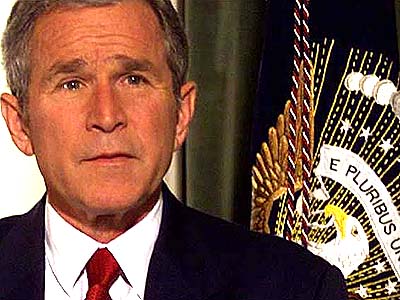
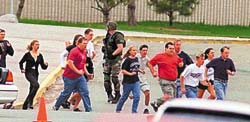 Another Stereotype of the Month entry:
Another Stereotype of the Month entry:

 Another Stereotype of the Month entry:
Another Stereotype of the Month entry:
Washington Post on the Warpath
By Cliff Kincaid | April 19, 2005
The Washington Post published a story on Match 25 faulting President Bush for not injecting himself quickly enough into the tragic killings at the Indian reservation in Red Lake, Minnesota. Post reporter Ceci Connolly found a volunteer at an Indian office who said about Bush, "I don't feel he cares about the American Indian people." This is a classic case of a manufactured story designed to make the president look bad.
Connolly, a contributor to Fox News, wrote that "The reaction to Bush's silence was particularly bitter given his high-profile, late-night intervention on behalf of Terri Schiavo, the brain-damaged Florida woman caught in a legal battle over whether her feeding tube should be reinserted." A left-wing website ran the story under the headline: "School Shooting vs. Schiavo: Why is Bush Silent on Red Lake?"
Did it occur to Connolly that Terri Schiavo was alive at the time that Bush intervened to try to save her life, and that the president could not have done anything to save the victims of that slaughter by an Indian youth in Minnesota? That is a clear difference, making the comparison illogical and unfair.
That statement about Bush's response to Schiavo and the Red Lake massacre was not attributed to anybody, meaning that it was Connolly's opinion inserted into a news story. This is from the same paper that tried to use a dubious memo to claim Republicans were politically exploiting the Schiavo case. It seems to us, based on these two examples, that the Post is playing politics.
Connolly's chief exhibit in her anti-Bush story was Clyde Bellecourt, described merely as "a Chippewa Indian who is the founder and national director of the American Indian Movement here." The American Indian Movement is known for objecting to the name "Washington Redskins" on the NFL team in the nation's capital. It is also behind the movement to free convicted killer Leonard Peltier from jail. Peltier was convicted and sentenced to two consecutive life sentences for his role in killing two FBI agents. Connolly didn't tell us that. Back in 1973, Bellecourt was the vice chairman of the National Alliance Against Racist and Political Repression, whose founder was Angela Davis, a top Communist Party member.
Playing the race card in an effort to incite more bad feelings and even hostility between the races, the Connolly story quoted Bellecourt as calling Bush the "Great White Father" and implied he was a racist for not saying or doing more about the Indians. However, a Post story on the same day said that the Indian tribe in the area "has resisted federal programs that would open up the reservation to private land ownership." Lee Cook, a former member of the tribal council, said, "We have just not ever been too crazy about white people coming around the reservation."
So the "Great White Father," President Bush, can't win no matter what he does. That means he's easy cannon fodder for the Post. If he does too much, he's a meddling white man. If he doesn't do enough, he's an uncaring white man.
In fact, one day before the Connolly story appeared in print, Bush had tried several times to reach the leader of the Minnesota Indian reservation where the shootings took place. Bush reached him on Friday, the day the Connolly story appeared. Bush also recorded part of his weekly radio address on the subject.
The Connolly story was misleading from start to finish. It began by suggesting there was a massive uprising: "Native Americans across the country-including tribal leaders, academics and rank-and-file tribe members-voiced anger and frustration Thursday that President Bush has responded to the second-deadliest school shooting in U.S. history with silence." In fact, six people were quoted in the article as saying that either Bush should do more or say something. This was the national groundswell.
Bellecourt probably said the anti-Bush statements without prodding, since he is a radical, but the others quoted in the piece may have been pushed to make inflammatory statements. It's not to hard to imagine Connolly asking questions like, "What do you think of the president's silence on your terrible tragedy?" This is how journalism is practiced these days. Questions are asked to get a certain response. She was sent to Minnesota to work on the story of a tragedy and came back with more Bush-bashing.
But here's the interesting fact: three days earlier, the Connolly article said, Bush White House spokesman Scott McClellan had in fact said something. "Our thoughts and prayers are with the families of those who were killed," he was quoted as saying.
In fact, he said more than that. McClellan was asked, "What about the school shooting in Minnesota? Is the President aware of that, and what does he think?" McClellan replied, "Yes, he was briefed on it last night. Our thoughts and prayers are with the families of those who were killed. This is a terrible tragedy. I think it's difficult for anyone to fully understand how something like this could happen. And our thoughts and prayers go out to the loved ones."
Let's recap: Connolly's article made an issue of the president's alleged silence, even though his official spokesman had already made a statement on it. And she didn't even have the honesty to report all of the president's response. If you examine the exchange, you will find that there was no follow-up by any member of the White House press corps. So it would appear that the press, not the president, was gripped by silence.
Connolly contrasted Bush's "silence" to how President Clinton handled the shootings at Columbine High School in Colorado in 1999. Only "hours" after that event, she said, "President Bill Clinton publicly expressed his condolences and followed up a few days later with a radio address in which he proposed new gun control measures and school safety projects."
Connolly neglected to point out that that Richard Castaldo, the father of a student who was shot at Columbine, was among those accusing Clinton of exploiting that tragedy. He declared that, "Bill Clinton once again used the Columbine tragedy as a prop in pushing his big government, liberal agenda."
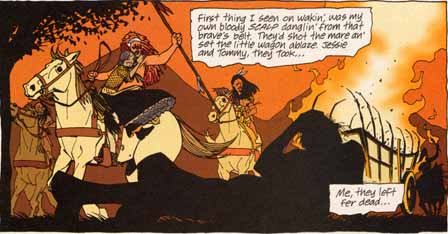
Rob's reply
The stereotype here is the headline: "Washington Post on the Warpath." Kincaid thinks the Washington Post is on the warpath at behest of Indians who are also on the warpath. This has the usual implications: that Indians resort to warfare when they don't get their way. That those who oppose an action are the problem, not the action itself.
Basically, you should never use the phrase "on the warpath" in conjunction with Indians. Unless maybe you're saying non-Indians are on the warpath against Indians. That's about the only context in which it seems fair.
>> This is a classic case of a manufactured story designed to make the president look bad. <<
No, it isn't.
>> Did it occur to Connolly that Terri Schiavo was alive at the time that Bush intervened to try to save her life, and that the president could not have done anything to save the victims of that slaughter by an Indian youth in Minnesota? <<
I'm sure that occurred to everyone, since it was patently obvious. But the issue is why Bush didn't offer condolences or comment in a timely fashion.
>> That is a clear difference, making the comparison illogical and unfair. <<
The difference makes the comparison less than perfect, but it doesn't render it illogical or unfair. No one expected Bush to bring the dead victims back to life. What they did expect was that he would use his presidential pulpit to comfort the survivors and alleviate the ongoing suffering.
>> That statement about Bush's response to Schiavo and the Red Lake massacre was not attributed to anybody, meaning that it was Connolly's opinion inserted into a news story. <<
Not really. It was a statement of fact about Bush's priorities based solely on the evidence. Judging by how Bush allocated his time, he cared more about one dying white woman than ten dead Indian people or their families or their community. What part of this conclusion is illogical or unfair?
>> This is from the same paper that tried to use a dubious memo to claim Republicans were politically exploiting the Schiavo case. <<
A "dubious" memo that a GOP staff member admitted writing. But regardless of the Schiavo memo, the Republicans were exploiting Schiavo for partisan purposes. Why else would they pass a law solely to benefit her? Why else would they remain silent about thousands of similar cases across the country?
>> It seems to us, based on these two examples, that the Post is playing politics. <<
Funny. Kincaid bases his conclusion on two examples, but later criticizes Connolly for a conclusion based on six examples. Did it ever occur to Kincaid that six is greater than two?
>> Connolly's chief exhibit in her anti-Bush story was Clyde Bellecourt, described merely as "a Chippewa Indian who is the founder and national director of the American Indian Movement here." <<
Merely? The national director of a national Indian organization presumably knows about Indian sentiment nationwide.
>> The American Indian Movement is known for objecting to the name "Washington Redskins" on the NFL team in the nation's capital. It is also behind the movement to free convicted killer Leonard Peltier from jail. <<
Yes...so? "Redskins" is a slur in most dictionaries and Peltier didn't get a fair trial. So how do these just causes impugn Bellecourt's opinion about Bush and Schiavo?
>> Peltier was convicted and sentenced to two consecutive life sentences for his role in killing two FBI agents. Connolly didn't tell us that. <<
Why should she? It would be like mentioning that AIM is against poverty, racism, or violence. It's irrelevant to the matter at hand.
If it were relevant, it would make Bellecourt look good, not bad. It suggests he fights against injustice whether it's in the courts or the White House.
>> Playing the race card in an effort to incite more bad feelings and even hostility between the races, the Connolly story quoted Bellecourt as calling Bush the "Great White Father" and implied he was a racist for not saying or doing more about the Indians. <<
I feel bad, even hostile, toward Bush and we're the same race. So it's not playing the race card to criticize him about this matter.
This is the same Bush who waited days before responding to the Indonesian tsunami tragedy with significant aid. And who doesn't care how many innocent civilians the US kills or tortures in Iraq and Afghanistan. Notice a pattern here? Brown-skinned people don't matter as much to Bush as white-skinned people.
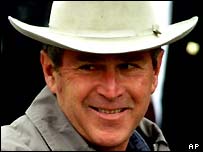
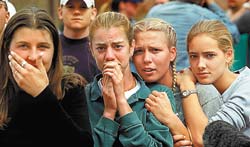
"Private land ownership" and Bush's response
>> However, a Post story on the same day said that the Indian tribe in the area "has resisted federal programs that would open up the reservation to private land ownership." <<
This is just as irrelevant to the issue of Bush's sensitivity as it was when David Yeagley made the point. To paraphrase Shakespeare, it's a lot of sound bite signifying nothing.
>> Lee Cook, a former member of the tribal council, said, "We have just not ever been too crazy about white people coming around the reservation." <<
"Coming around the reservation" is a far cry from providing necessary government services from Washington DC, of course.
>> So the "Great White Father," President Bush, can't win no matter what he does. <<
This is a fallacious conclusion not warranted by the evidence.
But if it were true, then what? Does Kincaid admit Bush made a political calculation not to respond? How does that square with Bush's supposedly genuine feelings? If you care about someone's suffering, do you weigh the political pros and cons before you respond? Or do you respond from the gut and damn the consequences?
>> If he does too much, he's a meddling white man. If he doesn't do enough, he's an uncaring white man. <<
How about if he does the right amount? He can do plenty without "meddling" or "coming around the reservation." Let's see him try for once by, say, increasing rather than decreasing the BIA's budget. Then we can judge whether Indian Country is giving him a fair chance.
>> In fact, one day before the Connolly story appeared in print, Bush had tried several times to reach the leader of the Minnesota Indian reservation where the shootings took place. <<
Or Bush claimed he had, maybe. Unfortunately, he forfeited his credibility as a truth-teller long ago.
Like spokesman McClellan's response, Bush's private response isn't the issue. How he responded publicly is the issue. The public might never have learned of his private calls to the tribe. It would assume, rightly, that Bush didn't want to come out publicly for Indians or against guns.
Besides, talking to Floyd Jourdain, the tribal leader, is only one thing Bush could've done. He could've expressed his feelings about Red Lake to the whole nation. That he didn't try to share his alleged grief with the nation in any way is the point here.
>> In fact, six people were quoted in the article as saying that either Bush should do more or say something. This was the national groundswell. <<
How many people constitute a "groundswell"? Did Kincaid really expect Connolly to interview thousands of people or conduct a statistically valid survey?
One of the six was Senator Ben Nighthorse Campbell, perhaps the leading Indian leader in the country. Kincaid conveniently omits this fact. If the No. 1 Indian said there was a problem, how much more evidence does Kincaid need?
>> Bellecourt probably said the anti-Bush statements without prodding, since he is a radical, but the others quoted in the piece may have been pushed to make inflammatory statements. <<
Maybe. Or maybe they muted their reactions to sound more reasonable and moderate. Maybe the groundswell was worse than the article suggested, not better.
>> But here's the interesting fact: three days earlier, the Connolly article said, Bush White House spokesman Scott McClellan had in fact said something. "Our thoughts and prayers are with the families of those who were killed," he was quoted as saying. <<
Kincaid's "interesting fact" isn't that interesting. The question is why Bush himself didn't respond. Responding through a surrogate isn't how you show your own deep, sincere, heartfelt feelings. It's how you avoid showing those feelings—assuming you even have them.
>> Let's recap: Connolly's article made an issue of the president's alleged silence, even though his official spokesman had already made a statement on it. <<
Connolly's article questioned the president's silence, not his spokesman's silence. Kincaid's point is irrelevant.
>> If you examine the exchange, you will find that there was no follow-up by any member of the White House press corps. <<
Given Scott McClellan's penchant for stonewalling, President's Bush's paucity of press conferences, and the White House's ongoing manipulation of the news, whose fault is that?
>> Connolly contrasted Bush's "silence" to how President Clinton handled the shootings at Columbine High School in Colorado in 1999. <<
Yes, and that would be a fair, logical, apples-to-apples comparison to make. Let's see the result.
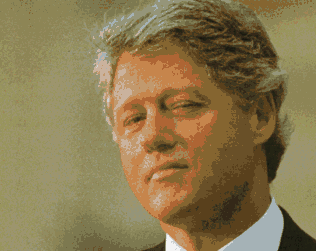
Clinton responded quickly, Bush didn't
>> Only "hours" after that event, she said, "President Bill Clinton publicly expressed his condolences and followed up a few days later with a radio address in which he proposed new gun control measures and school safety projects." <<
Whoops. That sure makes Bush look a lot more insensitive than Clinton. That would appear to be all we need to know about Bush and his sensitivities. Case closed?
>> Connolly neglected to point out that that Richard Castaldo, the father of a student who was shot at Columbine, was among those accusing Clinton of exploiting that tragedy. He declared that, "Bill Clinton once again used the Columbine tragedy as a prop in pushing his big government, liberal agenda." <<
Is that the best Kincaid can do? For one thing, that was only one parent's response. Talk about your lack of examples. This is even worse than Kincaid's previous reliance on a mere two examples.
For another thing, Castaldo was responding to the radio address a few days later, not to Clinton's expression of condolences. So Kincaid is making another unfair, illogical comparison. He has no case against the Indians who complained so he's tried to invent one.
Related links
Culture kills in Red Lake tragedy
Indians as warriors
|
. . . |

|
All material © copyright its original owners, except where noted.
Original text and pictures © copyright 2007 by Robert Schmidt.
Copyrighted material is posted under the Fair Use provision of the Copyright Act,
which allows copying for nonprofit educational uses including criticism and commentary.
Comments sent to the publisher become the property of Blue Corn Comics
and may be used in other postings without permission.